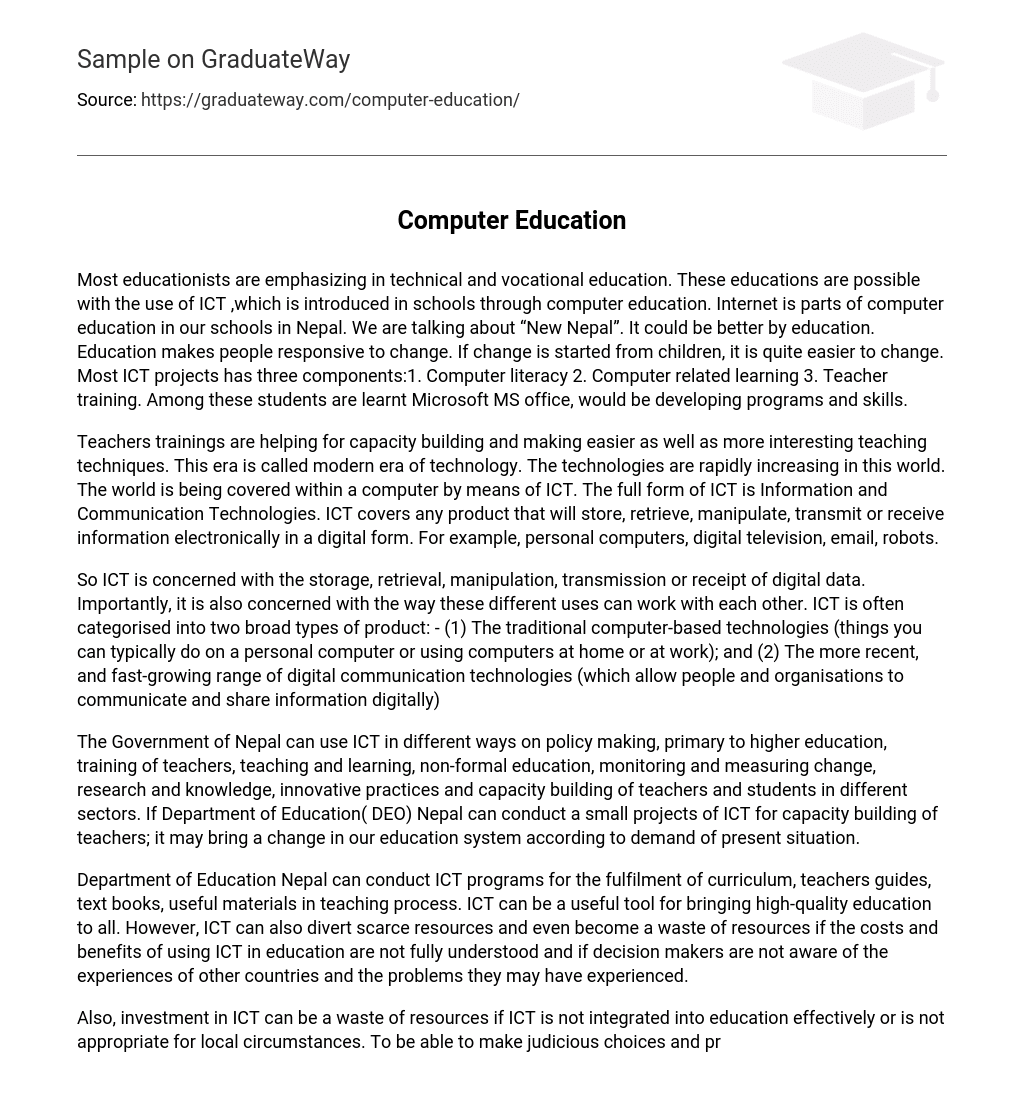Many educators are emphasizing the importance of technical and vocational education, which is facilitated through the use of Information and Communication Technology (ICT) in schools. In Nepal, computer education includes internet usage as part of the concept of “New Nepal”. Education plays a crucial role in improving society by enabling individuals to adapt effectively to change. By instilling this mindset in children, transformation becomes easier. ICT projects typically include three key elements: 1. Computer literacy, 2. Computer-related learning, and 3. Teacher training. These components allow students to acquire skills and knowledge in Microsoft MS Office and develop programming competence.
Teacher training programs are important for developing capacity and enhancing the effectiveness of teaching methods, particularly in the era of Information and Communication Technologies (ICT). This period is characterized by swift advancements, where technologies such as personal computers, digital television, email, and robots are essential for digitally storing, accessing, manipulating, transmitting, and receiving information.
ICT encompasses various activities pertaining to digital data, such as storage, retrieval, manipulation, transmission, and receipt. It also highlights the integration of these uses. ICT can be categorized into two primary types: (1) Traditional computer-based technologies involving tasks typically performed on personal or work computers; and (2) Emerging digital communication technologies that are experiencing rapid growth. These technologies enable individuals and organizations to engage in digital communication and exchange of information.
The Government of Nepal has a range of opportunities to use ICT in different areas such as policy making, education from primary to higher level, teacher training, teaching and learning, non-formal education, monitoring and evaluating progress, research and knowledge creation, innovative practices, and capacity building for teachers and students. The Department of Education (DEO) Nepal can bring about beneficial improvements in the education system by implementing small projects that aim at improving ICT skills among teachers.
The Department of Education Nepal can integrate ICT programs into different educational resources like the curriculum, teacher guides, textbooks, and other teaching materials. By implementing ICT, it has the potential to provide high-quality education for everyone. However, if the costs and benefits of using ICT in education are not carefully assessed, it can strain limited resources and become inefficient. Decision makers should be aware of the experiences and challenges faced by other countries to make informed decisions.
In order to avoid wasting resources, investment in ICT should be integrated into education and tailored to local conditions. Officials from the Ministry of Education and development agencies need knowledge about “ICT in Education” matters to make informed decisions and create effective policies, plans, and projects. Similarly, principals, teachers, and teacher educators in schools and colleges should be familiar with issues related to using ICT in their institutions.
A common understanding of the issues is crucial for effective dialogue and progress towards leveraging ICT to provide high-quality education to all. Computer education helps teachers overcome challenges like accessing website results, sending emails, and facilitating classroom learning brainstorming. These methods are more efficient than traditional approaches. With Google search, teachers can independently explore different systems, teaching methods, and learning situations.
Introducing computer education in schools may provide a valuable opportunity to promote sustainability in environmental, cultural, social, and political development within the country. While only a few schools currently incorporate computer education into their teaching and learning processes, the availability of information and communication technologies varies among schools in Nepal due to economic and technical limitations. Nonetheless, computer education has the potential to revolutionize traditional teaching methods in these schools and greatly aid in the creation of teaching materials for classroom activities.
Computer education has great significance in various aspects of education, including the construction of textbooks, curriculum implementation, and student activities. Through computer education and internet access, students are able to independently explore new methods and problem-solving techniques related to their curriculum. Some schools are even utilizing computer labs as typing offices, highlighting the growing importance of computer education in educational institutions. To address this emerging issue, the government of Nepal and The Monitoring Solution Institute have taken proactive measures to provide computer education in Sirdibas VDC of Gorkha district. As part of this program, internet facilities have been made available to the students of Buddha secondary school.
The government is providing Rs1800 per student per month for lodging and fooding. This is one of the exemplary works of the government for the use of computer education in school (Rai & Acharya, 2011). It is said that “Bazar centered education has more quality than the education of the village”. Some people say it is due to language, but it is actually due to the lack of technologies and information. This can be fulfilled by the use of computer education and internet together. The Government of Nepal has implemented a program called OLPC, which stands for One Laptop per Child. The laptop is a device for using ICT.





